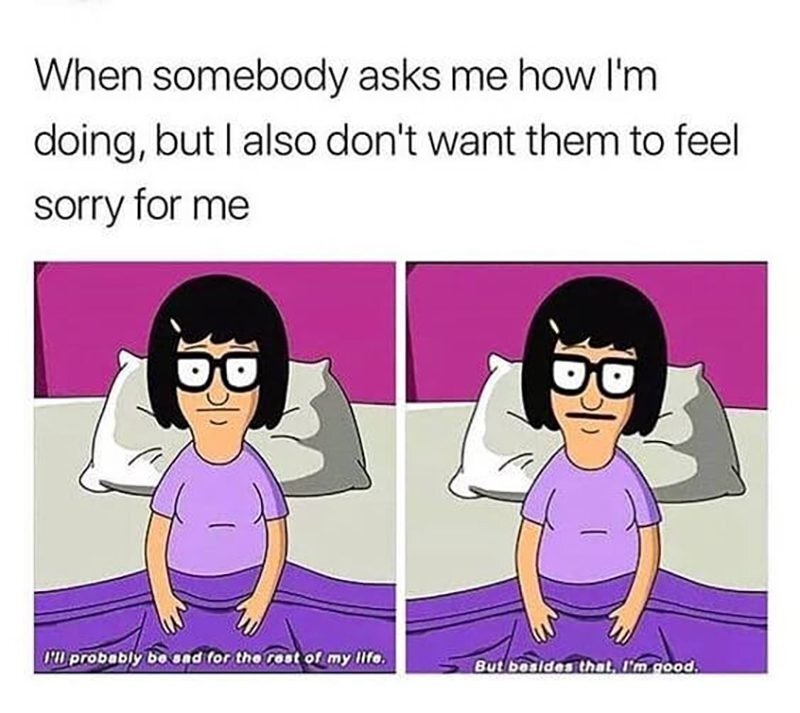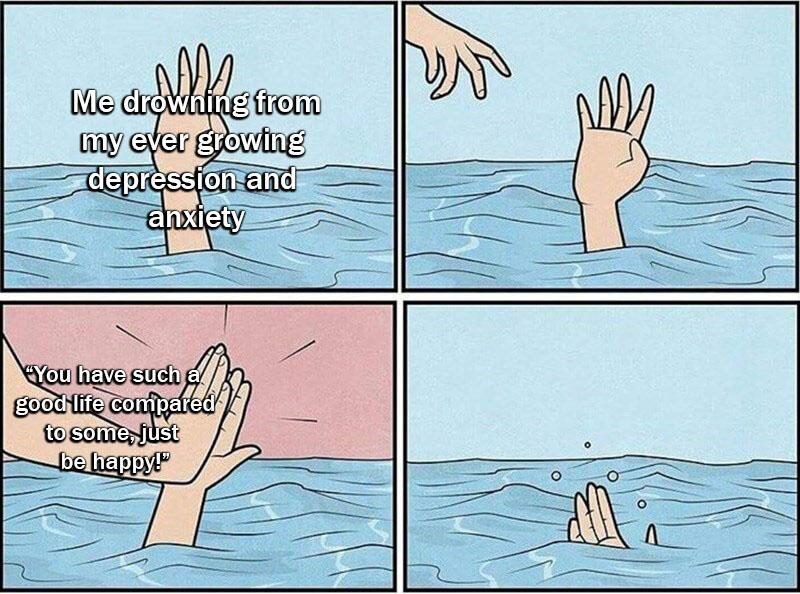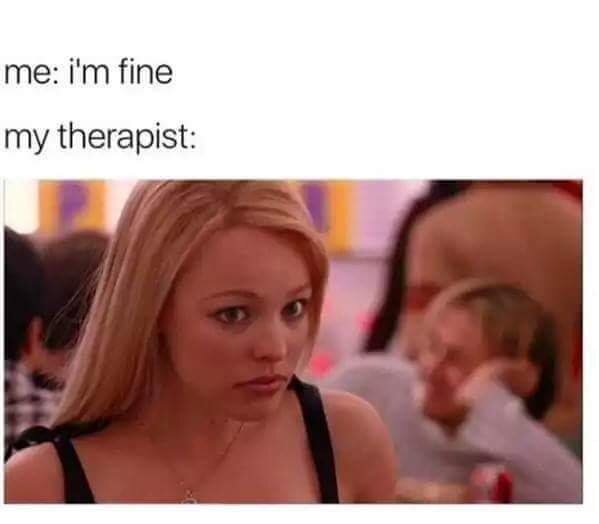Depression Memes: Modern Self-Therapy
/This is the best time to have depression in the history of humanity. Not because there is growing social understanding of depression, and not because we’re treating it with therapy and prescribed medications.
It’s because of memes.
Originally coined by Richard Dawkins in The Selfish Gene, he meant for it to be a descriptor of a cultural idea that is spread by imitation. Smalls changes over time may make the meme more likely to be spread, and it would go “viral”. The memes we know of today are of a different sort than Dawkins’ idea because they’re generally imbued with human creativity on a specific subject. While not exactly memes in the traditional sense, these modern hieroglyphics are a fascinating way to see people share concepts and experiences, and they’re an even better insight into populations that share mental illnesses.
I freaking love depression memes. Wish I had them in high school because if I did I would have known that other people were thinking exactly the same way I was thinking. With that knowledge, I might’ve recognized my depression sooner and found a way to get help earlier.
Dark humor has always been a refuge for me, and if I must dance upon the gallows of my mind; I’m at least gonna do a little jig. Here are my favorite depression memes coupled with why they represent true experiences.
Tina Belcher from Bob’s Burgers is my inner-dialogue put in cartoon form. She’s depressed, socially awkward, and yet remarkably confident in surprising situations.
The problem with being depressed and human is that we can conceptualize our own deaths, and we can reasonably expect to be depressed until we die. That is a depressing realization on it’s own, but when you’re dealing with major depressive disorder it’s a kick in the stomach.
As a part of my recovery, I’ve come to accept that I’ll be sad sometimes for no particular reason. It’s an unpleasant kind of acceptance, but it’s my lot to endure as best I can.
A gigantic “F@&k you” to anyone who has ever said this!
There are common themes for depressive. One of which is how often friends and loved ones have told us to just cheer up, or feel better.
No one tells an amputee to start regrowing a limb. That’s looked down upon in just about every culture. Yet, it is still perfectly acceptable to tell a person to cheer up after they’ve confided about experiencing depression.
Take a note from therapists everywhere - the good ones have never once said something like this because it instantly puts the depressed individual into a defensive mindset. Making it that much harder to connect, and much more likely that their depression will persist.
This is a variation of the “eat your food, there are starving children in Africa” refrain that I remember hearing as a kid. It makes just as little sense, and accomplishes nothing but an unnecessary guilt-trip. People eat when they’re hungry, not because they intellectually realize there is a food shortage somewhere in the world.
Sadly, this is the Meghan Markle experience. I’ve read dozens of ignorant and smug comments about how she had no reason to feel suicidal after marrying into royalty. Yet, a person drowning in six inches of water is just as dead as someone who drowns in an abyss.
A person’s inner-life may not correspond with their outer-life.
Just like “fetch” is never going to happen, no therapist allows the phrase: “I’m fine” to pass without a challenge.
Fine stands for four things:
Freaked Out
Insecure
Neurotic
Emotional
It’s a phrase that pings off a therapist’s radar, and has them asking: “How are you, really?” I’ve used “I’m fine” to deflect questioning from my loved ones, and it’s complete bullshit one hundred percent of the time.
I was first introduced to the concept of masking when I read about females on the autism spectrum. Masking is: “a process in which an individual changes or ‘masks’ their natural personality to conform to social pressures, abuse, and/or harassment.”
The term has since been co-oped by many populations and also for depressives because it checks many of the boxes that people living with a mental illness perform just to get through the day.
First, it’s exhausting. Trying to do one’s work and manage interactions while simultaneously keeping up a “happy face” to the world is a herculean effort that gets no respect.
Second, you feel guilty. Part of me has always disrespected myself because I’m performing to my friends and family when I’m not actually feeling good. I don’t like playing that part, but my depression often feels like a malevolent director steamrolling me into acting in scenes I’d rather avoid.
The bed in this image is apt as well. For me, the bed is where I can finally let my depression eat me. I’ve kept it at bay all day with tiny morsels of my soul, and the end of the day is when it gets to feast.
And people wonder why depressives are tired all the time.
This tweet from @BrandonEsWolf is as hilarious as it is accurate.
Growing up, I struggled with my depression. As a 33-year-old man, I’ve gotten pretty damn good at being depressed.
Depression says I’m gonna have a bad day? Cool, not like I haven’t done this dance before.
I watched plenty of He-Man cartoons as a kid. Also, Teenage Mutant Ninja Turtles, Dragon Ball Z, and The Justice League. Greyskull was He-Man’s nemesis, much like depression is mine.
The odd superpower depression gave me is the inability to be seriously harmed by any person’s insults. As a referee, this is a unique ability that I leverage heavily in all of my lacrosse games.
“You’re a terrible ref,” yells a coach.
“No, I’m a terrible human being,” my brain replies internally.
Now, there are things that are said to me that hurt, but generally, having been my own worst critic for over a decade it’s difficult for outside insults to match the malicious creativity that my depression has honed over the years.
My depression went into permanent remission when I first set my eyes on Baby Yoda.
Okay, not really, but it is remarkably difficult to be depressed when Baby Yoda is present (I mean just look at his wittle ears and wittle robe!).
Baby Yoda may not have cured my depression, but the amount of times my sister and I have shared Baby Yoda memes to cheer each other up most definitely helps cushion the psychic hammer blow.
(Seriously, even my depression is like: “Shit, he’s really cute.”)
Baby Yoda spreads happiness, and possibly cute aggression, which is a physiological response to seeing something so freaking adorable that one must squeeze it. As a result, teeth clench, muscles tighten, and the pupils dilate. Baby Yoda memes put my brain in the present moment, and gets it out of ruminating about some past experience that doesn’t matter.
There are many, many more memes to view. I follow accounts that share silly memes and funny cartoons because when I’m feeling depressed it’s a simple pleasure to open my phone and know that I’ll see something that will make me laugh even when all of me wants to cry.











